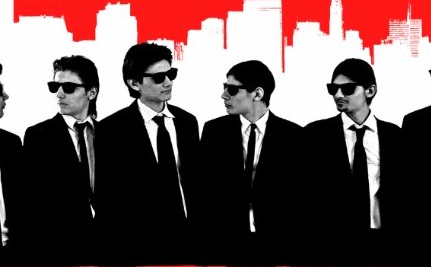
 Some films take hundreds of hours of tedious work and countless exhausted nights of ulcerous brooding. Some simply make themselves.
Some films take hundreds of hours of tedious work and countless exhausted nights of ulcerous brooding. Some simply make themselves.
“The Wolfpack” was shot mostly on New York’s Lower East Side by home video masters the Angulo brothers. Locked up in their apartment for over a decade, held captive by a paranoid father and co-dependent mother, they filmed what they knew.
What they knew was the films they saw, some five thousand of them, carefully stacked DVDs that represented ninety-nine percent of the outside world. This movie is a look at that world through their eyes. The family consists of six boys, close in age, a younger sister and mom and dad. The parents came to NYC from South/Central America because they wanted to get to Scandinavia but could not manage it. So they figured the LES was close enough and they would move on when the time came. Once there, the parents quickly decided that Mid-west mom should home-school the kids because, in her words, “A lot of the socialization kids get in school is not that great of socialization.” An understatement to some, no doubt.
They succeeded in their isolation until the boys were in their late teens. Their father was the only one who had the keys to the front door, which he would lock whenever he left. He rebelled against the system by not working, but still managed to get food somehow on his trips out of the unit a few times a week. His standing order was that interaction with the outside world was verboten, unless it is “getting a music contract” which is OK. A “Jackson Five” complex? Maybe so.
Then, one by one, like chicks hatching from eggs, the boys escaped from the apartment and began living in the outside world. Before they exited the apartment on their own, they had been allowed out only a few times a year, totally supervised. In one year they did not go out at all. Not once.
The boys rejected the option of insisting on going to public school because, in an amazing statement of pretzel logic, to do so would deny their mom her job of home-schooling them. As it turns out, she is paid by the government to home-school the kids and the boys refuse to send her out to work “out there” just for the privilege of going to public school.
The documentary consists mostly of the reenactments the boys perform for their own amusement and creative outlets. They know, by heart, all of the lines to “Reservoir Dogs” and recite them precisely while acting out the parts in costume in the apartment. If all this is not strange enough, by the end of the film not only has the family emerged from the claustrophobic flat, but the boys have actually made their movie. It is not a recording contract, but it is a film distribution contract, and that is close enough for now.
The last twenty minutes of the film shows the boys seeing things for the first time that the rest of us know from childhood. Smelling the sea, feeling the sand, seeing the grass. “It’s just like 3-D,” is the summary judgement. Astounding as it seems, they, and mom and dad, come to some realizations about the world at large that surprise and delight.
Rating: 7/10